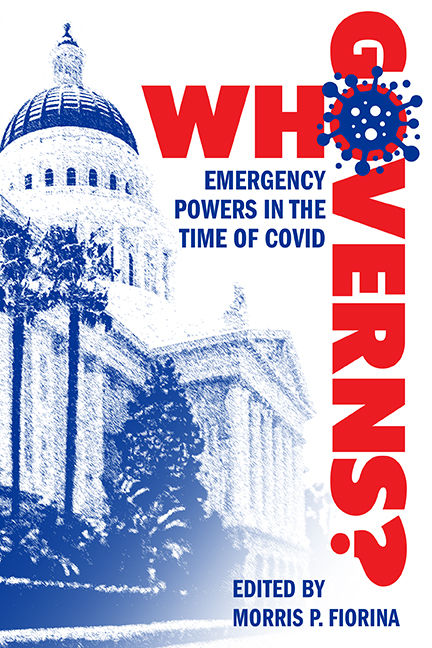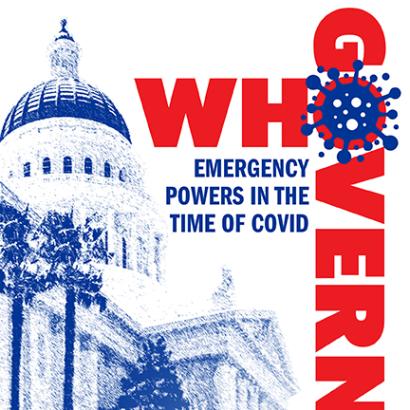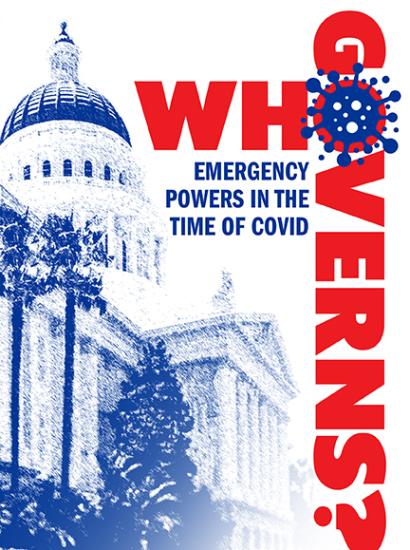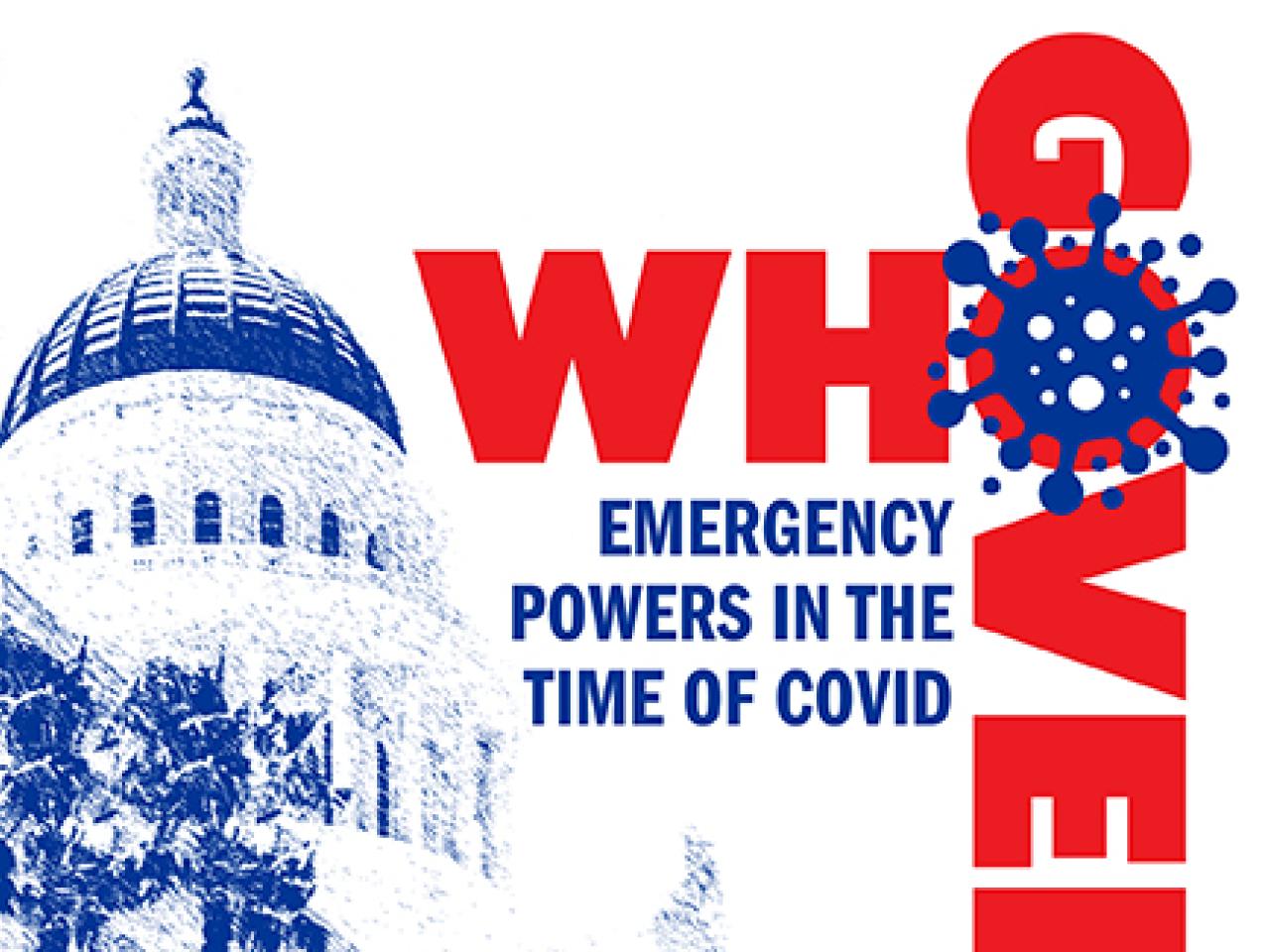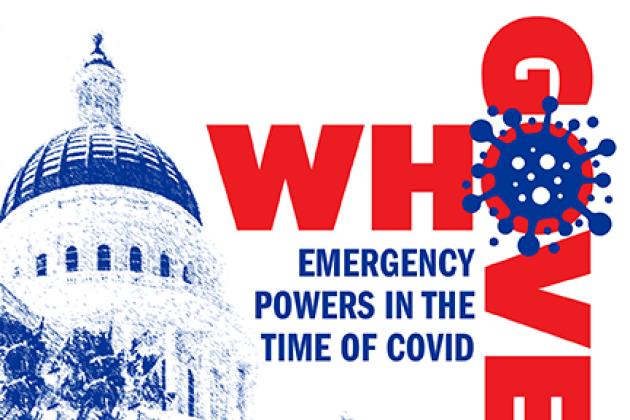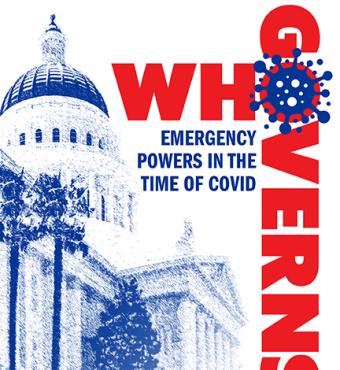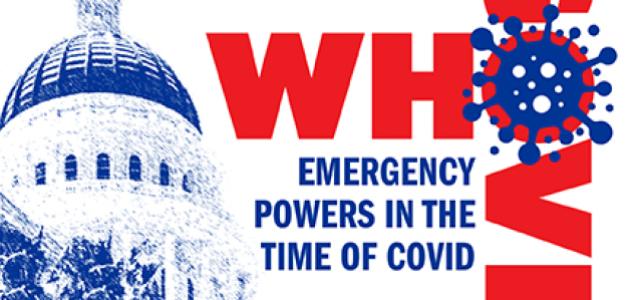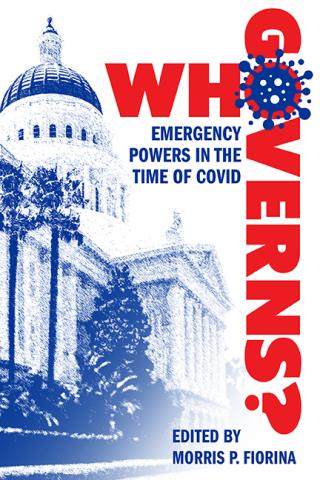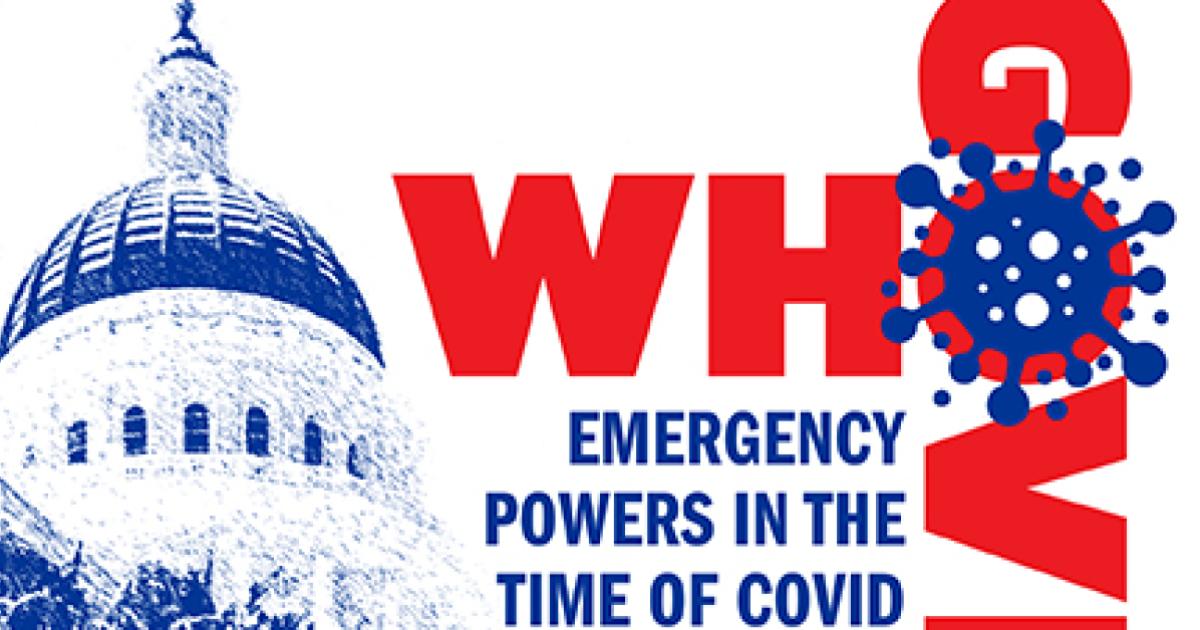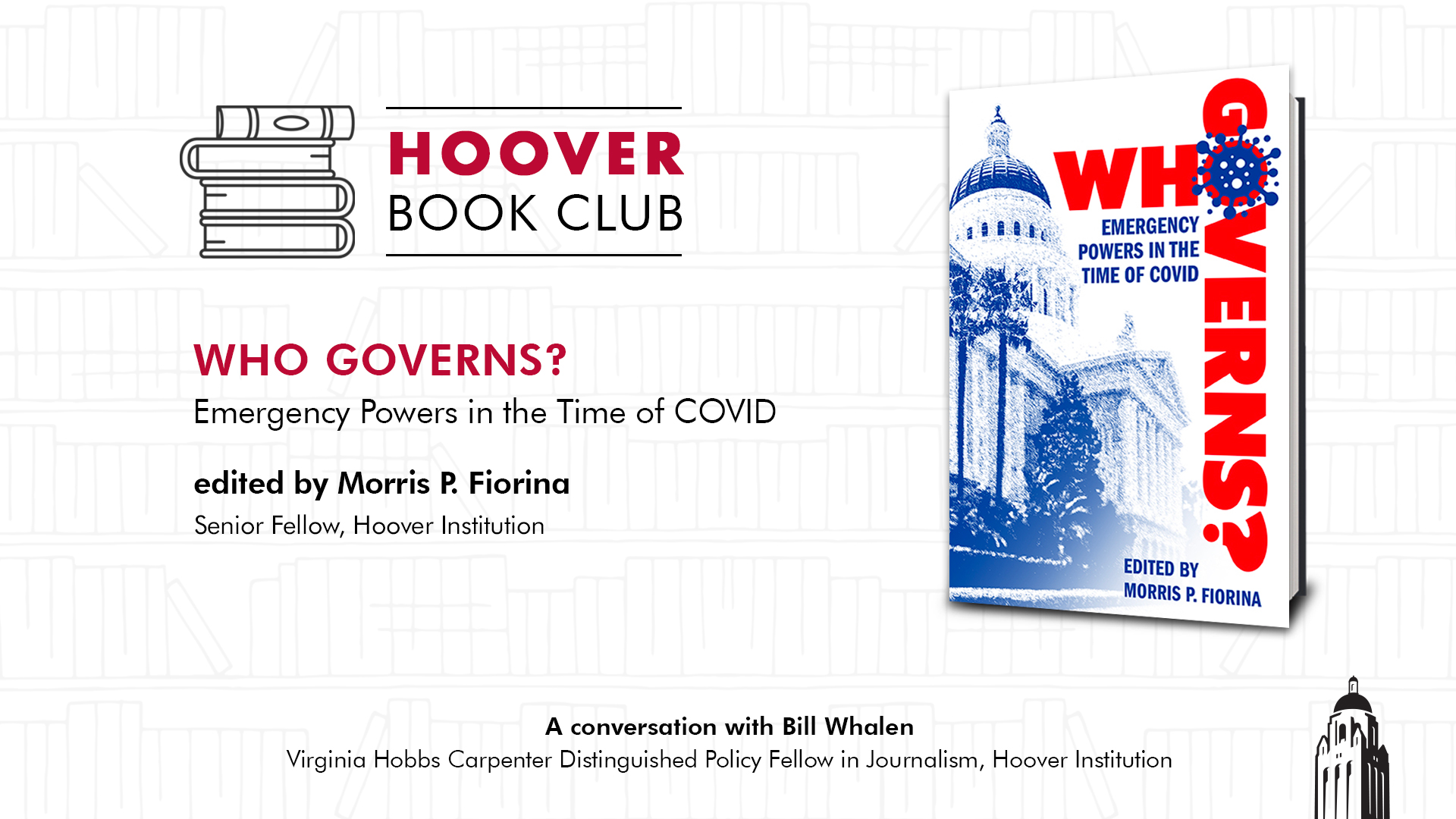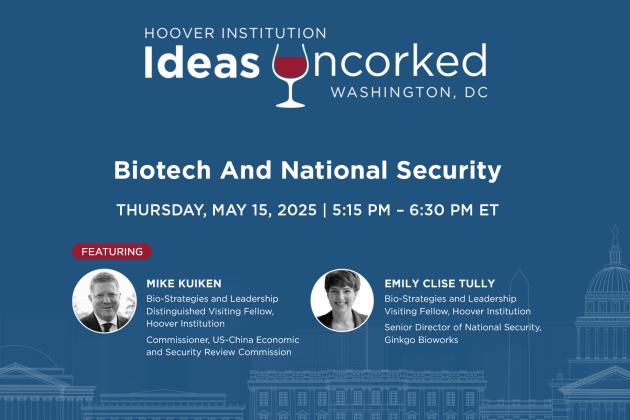Join the Hoover Book Club for engaging discussions with leading authors on the hottest policy issues of the day. Hoover scholars explore the latest books that delve into some of the most vexing policy issues facing the United States and the world. Find out what makes these authors tick and how they think we should approach our most difficult challenges.
In our latest installment, watch a discussion between Bill Whalen, the Virginia Hobbs Carpenter Distinguished Policy Fellow in Journalism and Morris P. Fiorina, a senior fellow and author of the recently released Hoover Institution Press book Who Governs? Emergency Powers in the Time of COVID on Tuesday, March 7, 2023 at 10:00 am PT/ 1:00pm ET.
WATCH HERE
>> Bill Whalen: Hello, I'm Bill Whelan, I'm the Hoover Institution's Virginia Hobbes Carpenter distinguished policy fellow in journalism. I'd like to welcome you back to the Hoover Book Club, where we bring Hoover fellows and friends together to discuss their latest writings. Our guest today is Morris Fiorina, Morris Fiorina, or Mo Fiorina to us, friends, is a senior fellow at the Hoover Institution and the Wendt family professor of political science at Stanford University.
His research focuses on elections and public opinion, with particular attention to the quality of representation, that is, how well the positions of elected officials reflect the preferences of the public. He joins us today to discuss a new book he's edited, it's titled who governs emergency powers in the time of COVID, Mo, congratulations on the book, and thanks for joining the book club today.
>> Morris Fiorina: Thank you, Bill, happy to be here.
>> Bill Whalen: Well, thank you for joining us again, so let's talk about the book, and let's begin this way. This book is a departure for you, I'm not gonna say how many years you've been teaching. I think we can talk in groups of decades, more so than years, my friend.
But this is a departure for you, this is not something you have done, is it?
>> Morris Fiorina: That's absolutely right, and I will speak in terms of years. I've been a professor for 51 years, and this is something that has never looked into before, it's very different from anything I've done before.
>> Bill Whalen: Okay, and let's describe exactly what the book is, I would point out to those who haven't read it yet. If you want to read about the pros and cons of various COVID policies, lockdowns, vaccines, the merits of government spending, this is not the book for you. This is not, go check out Scott Atlas or Jay Bhattachary or Hoover colleagues who go down that line and they talk about the pros and cons of policies.
What Mo has done is he's brought together political scientists and researchers and legal scholars to discuss what COVID policies have met in terms of governing, and Mo, what sparked the idea for this book?
>> Morris Fiorina: What sparked it was that if you go back almost three years to the day, I believe was March 16, three years ago.
>> Bill Whalen: Yep.
>> Morris Fiorina: It's a normal day at the office, and then suddenly the word comes through from Stanford, shut down your computers, close up your offices, and go home. And there was some milling around in the halls, and so there's some joking. Well, surely Hoover fellows are essential workers, they couldn't really mean we should go home, but in fact, we were told, yes, you should all go home.
And over the next couple of days, as I just observed what was going on, that the local economy had been totally shut down, constitutional rights such as assembly and freedom of religion had been suspended. And I thought this was all pretty amazing, and this had all been done under the authority of county officials who were appointed, not elected.
And their actions were authorized by pre existing statutes and constitutional provisions giving them this authority. So I sat down, I wrote an email to Condy, our director, and just noted that there were just real implications here for democratic governance, which is one of the three pillars on which the Hoover institution stands.
And somebody ought to be on this. Now, anybody who knows me knows when I write something like that, I mean, somebody else at Hoover ought to be on this because I was born without any kind of organizational genes whatsoever. But Hannity didn't know that, and she just wrote back and said, you're right, Mo, why don't you get on it and we'll support you?
And I didn't wanna disappoint the boss, so even though I've never done anything like this study, I thought, okay, I'll take a look. And the first thing an academic does, obviously, is go get the data. So I asked around, I wanted to find a website or a big reference book about all these state emergency powers.
And I learned fairly quickly there wasn't any such thing, and at that point, I thought, well, this project's not gonna go anywhere, and here's where just a fortunate accident made the project possible. I live in Portola Valley, which is in San Mateo county, and our restrictions were just not quite as severe as most of our, as in Santa Clara county, where most of our colleagues live.
And so I would invite colleagues to come up and go for walks in the countryside and sit on our deck and have wine and cheese, all socially distanced, of course, but this is how we kept in touch for a better part of a year. And one day I was walking with Bruce Kane, who is the director of the Lane center for the Study of the American west.
And I mentioned, he asked me what I was doing, and I mentioned, well, I'd started to do this, but it wasn't going anywhere. There was just no data, and Bruce said, well, wait a minute, he said he had already hired interns. His center had hired interns whom they normally put in state agencies, and now everything was remote.
So he was committed to support these students for the summer and didn't have anything to do with anything for them to do, and he said, you can have them. And so here was a subsidy from another unit of Stanford to the Hoover institution. I have a graduate research assistant, we were working on gun control at the time, and so we pivoted, and my assistant put together this team of undergraduates who began the arduous task of reading all the state constitutions.
And then we learned quickly that most of the provisions are in statutes, they're enabling statutes, not constitutions. So tracking down and reading all the statutes and putting the together a database. So you wanna know, and this is up on the Hoover website now, if you wanna know what Arkansas can do or what California can do, etc, then we can tell you.
And so we, at that point, I started looking around for other people. I felt at times like, you've seen the old magnificent seven movie with Yul brynner, goes around picking up other gunfighters, doesn't have anything to pay them with, doesn't anything to offer he just picks them. I had a magnificent nine that I just approached people who I'd heard about or read about, and as would you do a paper on this subject.
And this group of fine scholars, in some cases, graduate students, in other cases, fine scholars, and younger scholars, older scholars. They just contributed a really nice set of essays, I think, which really cover the ground, everything from the historical and philosophical background of emergency powers to how they were actually implemented in states like Texas and California.
I approached at one point we didn't have any lawyers, and so I approached again after asking around the Brennan center at NYU, and the director there, Lisa Gottwine, was really just above and beyond the call of duty. She gave us a advanced law student to keep track of all the court cases arising from the exercise of emergency powers.
And Victoria Ochev just put together a really nice essay, and again, a database, if you wanna know, all the court cases and what they were about, this, too, was up on the Hoover website. And so in the end, I think this book is a starting point, that the large part of the emergency is running its course.
But surely there will be others in the future, and there are a lot of questions are going to be asked now about what we did and who should have done it and so forth, and was it right in a democracy? And so I think in all kinds of public policy courses, law school courses, political science courses, etc.
And just for the concerned layperson, this book sort of lays on a lot of the issues and could start a conversation that I think we really need to have.
>> Bill Whalen: It would also say, for the layperson out there, it's just very easy to read, these essays are just very, very well spelled out, Mo, they're not thick.
They're not written for people with an IQ of 180 or higher, it's very easy to digest. So at the heart of this book, Mo, is the question of who has legitimate authority to take action during periods of emergency. And I would note, you began by saying that California is approaching its three year anniversary of the lockdown.
This debate continues even though California ended its state of emergency for COVID at the end of February. We have a colleague, Michael McConnell, we have colleagues, John Kogan and John Taylor. They filed an amicus brief and two cases before the Supreme Court right now, Mo. Which have to do with what the Biden administration's using, justifying.
Student loan forgiveness last year by tapping into the Heroes act. The Heroes act was a product of the 911 era, which allows the secretary of education to cancel student loan repayments during, quote, a war or other military operation or national emergency. And so what McConnell and Kogan and Taylor are saying, is this really a proper use of emergency powers, if you will?
So this question is gonna continue with this. Even though we're getting through Covid itself, even though we're getting through these various state emergencies, federal emergencies, we're still going to be wrestling with this issue about who exactly has power during times of emergency for the foreseeable future, I think.
>> Morris Fiorina: Yes, I think you're absolutely right.
>> Bill Whalen: Okay, so let's get into the book itself Mo. So it's divided into three parts. One, state emergency powers, two, emergency powers in practice, three, response to the exercise of emergency powers. How did you decide those three topics?
>> Morris Fiorina: I think it's pretty natural, really, that, as I said, my inclination as an academic is, first, what's the lay of the land?
What did the data actually show? And so the first several chapters just fell into place naturally. And also my friend John Fairjohn, who contributed a legal chapter. And then we heard about, we knew DD Kuo was doing a study of California. And we have a Hoover fellow, David Liao, who's headquartered in Texas.
And so it's pretty natural to sort of contrast a deep blue state and a deep red, not so much a deep red state, but a red state, clearly, on how they approached the subject. And then there was obviously a lot of publicity about public opinion and again, a lot of maybe not quite as much about court cases, but clearly a great deal was happening in the judicial system.
And it's actually very interesting. I think one of the things that comes out of the chapter on the courts is, and maybe I'm getting ahead of myself here on too much specificity, but we often hear criticisms today about activist judges. And the judges are not just interpreting, they're making the law.
Well, here was almost the exact opposite situation where increasingly the judges, the judiciary, began to rein in administrators, that they began to question whether administrators actually had the authority to act, to do the things they were doing. Was there real, was real evidence? Los Angeles judge sort of led the way, saying, I want to see the evidence for what you're doing has any impact.
And like Victoria in the essay, sort of begins to call for strict scrutiny, that these are really basically life and death powers are being exercised by officials. And the judges really ought to treat them in the same way as they treat fundamental questions of free speech, free expression and so forth.
And not just the rational basis, does the administrator, does the bureaucracy have sort of a rational basis. But in fact, really, given the implications for personal liberties and so forth, judges should be exercising a more, how much more strict scrutiny of administrative decisions, bureaucratic decisions.
>> Bill Whalen: Right, now you co authored an essay with Cameron Dehart, I believe Mo she is a Stanford PhD in political science.
And in the essay, you two point out that this is a reminder that America is a republic and the republic consists of states, and states have various rules of how emergencies are declared and extended and ultimately rescinded. Is this a good system, Mo?
>> Morris Fiorina: I basically beg off questions like that because it's the system we have and it's not going anywhere.
I mean, this belongs in the same category as the Senate.
>> Bill Whalen: Yeah.
>> Morris Fiorina: The Senate is malported. Well, it is, but we're not gonna change it, so the point is, in contrast to other countries, of course, like Britain, France. I remember we were in a zoom every week with European colleagues and we keep of what's going on over there and the way France carried out this, you can just have one central order.
It's the same across the entire nation. And that's just totally different from the way things we do in the US. And one of the things actually we found out very quickly was that emergency powers are nearly mostly sort of located in the states. And the federal government actually has very little in the way of specific emergency power authority.
And so this just has historically been something exercised by the states. Now, granted, it's typically been more natural disasters and so forth and not so much, in California, we continually have these medfly infestation, earthquakes, floods, etc. And that's more typical of what emergency powers have been aimed for in the past, the federal government was about the only ones worried about insurrection and foreign invasion.
So it's mostly a state level thing we're talking about, and that's the system we have, and we're not gonna leave it anytime soon. So whether it's good, bad, all I know is it's different.
>> Bill Whalen: And through your research, Mo, have you found, is there a good definition for emergency?
Have the states reached any sort of consensus to what actually constitutes an honest to goodness emergency?
>> Morris Fiorina: No-
>> Bill Whalen: Because we're gonna get to California in a minute where we're gonna see how this is really widely expanded. But when you look at the 50 states, is there a pattern?
>> Morris Fiorina: Not really. I mean, an emergency is in the eye of the beholder.
>> Bill Whalen: Yes.
>> Morris Fiorina: And in the case of COVID early on there we were being deluged with information, but, I mean, millions were all gonna die. And I think everybody sort of took a cue early on and said, yes, all the states very quickly declared states of emergency.
But then things began to sort of disentangle fairly quickly after that as the infections began to spread and so forth, spread more in some areas, less in some areas, and we began to learn a little more about the disease. But one of the concerns raised by judges, phosphors and others is simply that executives, boy, this looks really sort of attractive that I can go here in emergency and don't have to worry about all these interfering legislators and others, that I can just do what I want.
And so there is that, let's just say that the incentives for executives to declare emergencies are clearly there. And so we depend to some extent on the personalities and the personal values of the executives and the coalitions that put them in office.
>> Bill Whalen: Right, now let's look at California for a second, where you and I live.
So back in October, Governor Newsom announced that he was going to put an end to the state's Covid, emergency. But then he put some distance into it. He said it's gonna end at the end of February. And people said, wait a second. Why are you waiting till February?
He said, where'd the effect move? Well, we got to wait and see what happens between now and February. So the declaration continued. Newsom's interesting in this regard. He does a lot of things with great fanfare. He's very adept at getting attention, social media and so forth, to the point where he's now talked about as a potential national candidate sometimes Mo, he does things without so much fanfare.
And here's a good example. On the last day in January, Governor Newsom signed a proclamation ending 26 open states of emergency in California dating back to 2017. Let me repeat that, 26 open states of emergency. Mo, we're talking fires, winter storms. Monkeypox was on the list. Can you argue that California maybe takes this to the extreme?
>> Morris Fiorina: Well, I mean, if you're in favor of limited government, as I think I am, you probably do have a tendency to judge things in that direction.
>> Bill Whalen: Yeah.
>> Morris Fiorina: But it's also one, I'm sure this strikes you. You've been here much longer than I have. California is really up there, and it turns out the number of ways to stop anything from happening.
>> Bill Whalen: Yes.
>> Morris Fiorina: And so you can really understand how, especially when something really does appear to be an emergency, like, say, fires and so forth. Well, there's different. Categories here. I mean, one of the reasons you declare emergencies on things like fires, earthquakes is to get money. You just want the federal money to come flowing in as fast as you can.
And there's also, by the way, very strong evidence in the political science literature that governors profit from very quick infusions of money during emergencies. That even if you don't get the money to declare an emergency and ask for it, has an electoral payoff. But I think California, it's just very hard to do anything.
And so I can really understand how a governor can just be tempted to say, I'm going to declare an emergency and be done with this. I'll be able to do something rather than try to fight it through the legislature and all the court seats, etc.
>> Bill Whalen: I think California had a rather unique distinction.
Beginning of the year, Mo, we already were under a drought emergency, and then it rained like nobody's business and the governor declared a flood emergency. So at the same time, we were both dry as dust but also flooded.
>> Morris Fiorina: Yes, exactly.
>> Bill Whalen: Okay, so are any good government groups Mo looking at state powers and looking at the question of emergency authority?
I'm looking at, for example, the national conference of state legislators, which at all times love to examine how states go about their practices.
>> Morris Fiorina: I have not been aware of any, I did give a Zoom presentation like this to an organization of state legislative employees. But other than that, I mean, when I wrote the polarization books, I was immediately contacted by all sorts of good government groups wanting me to sign on and sort of wanting advice, be on the board, etc.
Nothing like that has happened with the emergency powers book. Now, of course, it's really only been out for a month, so we might, I mean, it's bad in a way that these kinds of questions are just not as sexy as sort of electoral. They're philosophical, they're legal, and I don't think they grab the popular imagination quite as much we have seen as we do.
We point out in chapter eight quite a bit of pushback on the part of legislatures. And I'm sure when this all broke, most state legislators had no idea that these powers existed. I think they've just never been used in our lifetime, these kind of lockdowns and sort of things we're talking about here.
And so there has been quite a bit of pushback. And we talk about all the successful ones, mostly in the chapter eight. And so I think the database is sort of updated some from what it was originally when we compiled it in the summer of 2020.
>> Bill Whalen: Well, Mo, it may seem academic, it may seem wonky, but I would argue to the contrary that actually there are real world ramifications for what goes on here.
And California and Texas a good example. So let's go to the second part of the book, which is emergency powers and practice. And you have chapters in which talk about California's approach to public health authority and Texas's approach to public health authority. And no surprise, I hope everybody's sitting down.
California and Texas go about this a little differently. Let's begin with the Golden State or California here. What's interesting about California, I find Mo is for as much grief as Gavin Newsom got during the course of COVID restrictions. He ultimately was the subject of a recall election in November of 2021 that failed.
He actually was hands off in at least one regard. If you look at COVID, they're left to county health officers, and these are people who, A, are unelected and B, aren't necessarily scientists. I would point you, for example, to Los Angeles County, Barbara Ferrer, who is the chief health officer of Los Angeles county.
She's doctor Ferrer, but she has a doctorate, well, a PhD in social welfare. She is not an MD by any means. Anyway, I mention this because I think this feeds into something which you were alluding to earlier about the sort of arbitrary nature of the COVID lockdowns in California.
You live in San Mateo County. I live in Santa Clara county, which is next door. I'm in Palo Alto. I get my hair cut in San Mateo county. So I would have to hop in my car, put on my mask, and then once I'd cross the county line, the mask would come off.
And so for a wonderful hour, I wouldn't have to wear my mask. But then after I got my haircut, get back in my car, go back home, put on my mask again, and at a certain point, people kind of wonder. This is a strange existence, isn't it? So California, how did California Mo get in the situation where he had unelected officials making these policy decisions?
It would seem to me this is why you elect people.
>> Morris Fiorina: Yeah, I don't know what the original idea, but yeah, we certainly saw, I mean, the difference between San Mateo and Santa Clara could have been a case study in and of itself. I already mentioned this earlier, that our San Mateo county just was much less restrictive.
Stanford sports were affected in this way that the football team we pointed out in the book was not allowed to practice in Santa Clara county on campus. So they would get on buses and bus up to Woodside High School in San Mateo county. Now it's unclear what health benefits could have been served by packing these guys into buses, moving them, coming back like that.
Same thing with the Stanford women's basketball team. They were on the road for, I mean, their whole season was.
>> Bill Whalen: They didn't play a home game, they played down in Santa Cruz. They played games down in Santa Cruz.
>> Morris Fiorina: Yeah, and the San Jose state football team, which hadn't had a ball game in ages, just said, screw it.
And they go out on the plane and went to their ball game in defiance of the county health officer's orders. Yeah, the orders left a lot of discretion to the county health officers. And as you say, Santa Cruz county health officer was very strict on things. Also enforcement.
That another thing we find out, and again, not having done this kind of work in my whole life. It was sort of a shock to realize that in about 2000 of the nation's 3000 counties, sheriffs are the principal law enforcement officer. We think of all the police departments in big cities and that's the way it is but in most counties, the sheriff is the top person.
And a whole lot of sheriffs just said, not enforcing this, they are elected. That's the important thing. And so the pressures they were under were very different and the incentives they faced were very different from the incentives faced by county health officers.
>> Bill Whalen: Right, well, one of the challenges there, Mo, is just the practicality of how to carry out the enforcement.
And California is notorious for doing this. I would point you, for example, to our hands free driving laws. This was put into law by a lawmaker named Joe Simitian, who is from Palo Alto. These parts, it makes all the sense in the world. What the law says is that if Mo Fiorina is driving down the highway, he can't be looking at his device and playing with the device while he's driving.
He's going to have an accident. Well, the only problem with that law is what makes common sense, how do you enforce it? I remember I would randomly walk up and down streets in Palo Alto during rush hour and just kind of look into people's cars, not being too much of a creep, but just looking at people's cars.
Everybody had their head down looking at their device and they'd start inching forward looking at the device. The point is, Mo, you didn't have cops in every corner, citing people with tickets. You just can't enforce these. And so this is one of the problems that California ran into in terms of how to actually enforce or not.
But let's shift now and look at Texas, where we had a different covert response. This was Governor Abbott and city and county officials. So how did Texas differ from California?
>> Morris Fiorina: Well, Texas differs in, this was interesting that the county judge, I'd never heard of that before, is the principal official in most Texas counties.
And they have enormous power. And so the Texas group just went to considerable length talking about this, the way things are done and enforced in Texas. And it was highly decentralized that they had a great deal of variation as opposed to, say, like Houston, Austin, etc, as compared to a lot of the outlying regions and so forth.
And so, I mean, the state is geographically very large like California is. But the governor didn't sort of impose the same kinds of uniformity in Texas that Governor Newsom imposed in California.
>> Bill Whalen: Right, very well. I think one thing which I found interesting reading the book And the part on Texas, you saw a dichotomy among public officials, Mo, for example, lieutenant governor, he wasted no time going on Fox News and trashing lockdowns.
He played to very much a red meat audience, at the same time, though, in Texas, you had big city mayors who were listening to science and health officers. So did you find this surprising to see this sort of dichotomy, if you will, and how these officials approach their jobs?
>> Morris Fiorina: No, I think I'm not surprised by much of anything in American politics anymore. Yeah, they don't run on a ticket in Texas either, so the guy has an independent power base. So, no, I mean, one of the, one of the interesting things about doing this project is my research, and research in most political sciences is nationally focused.
And so to realize the incredible variation that goes on in the American states, and we always talk, there's the old saying about how the states and the laboratories of democracy. We really ought to be studying state politics more just to see how institutional arrangements work on differently that we tend to think of.
Just the national pattern is the only pattern, but there's actually 50 other patterns of legislatures, executives and judiciaries, and it turns out in their actual operation, they vary enormously.
>> Bill Whalen: Yeah, this seems to me to have been one of the problems once we got deep into the COVID crisis, you had a lot of politicians engaging in what I'd call performative politics.
This is a conservative going on Fox News, a liberal going on MSNBC, and basically just kinda saying what the echo chamber wants to hear. I don't remember too many Daniels and the Lions end moments where a politician of one stripe went on a network of a different audience and actually tried to explain what he or she was doing.
>> Morris Fiorina: I think that is largely true, there were a few cases of where I think Mike DeWine in Ohio was pretty good. He was, I mean, he, and in most cases where we saw state conflict, it was between a republican governor and democratic legislature or a democratic. There are actually only a couple of those, mostly a democratic governor, republican legislature.
DeWine was actually facing republican legislature being republican, yet he still had a lot of conflicts. And he tried to explain exactly why he was doing the things he was doing, and one of the things it brings out is people have different constituencies. And when you think about people in legislatures, they respond to local districts.
Some of them are being hammered economically, others are in big city minority neighborhoods where the virus is running wild. And then the governor, meanwhile, is the governor of the entire state and has a much more state outlook. And I think we saw, and when you look at democratic governors, their constituency is public sector workers who are working remotely and not being laid off.
In most cases, republican governors are facing constituencies of private business and who are being hammered by the COVID shutdowns. And so I think we saw a lot of just how different politicians responded to different electoral coalitions during the pandemic.
>> Bill Whalen: Right now, somebody who did do a lot of media and showed up on all sorts of circles was Doctor Anthony Fauci.
But again, here we're getting back to the premise of the book, and maybe one of the lessons we learned here, Doctor Fauci was, at the end of the day, an authority on this topic, but also an elected official. And you can argue the more that Fauci was on television, the more it probably raised questions and minds of some people.
Why is he the one on TV talking and is he the one making the decisions, should he be the person in charge here?
>> Morris Fiorina: Yeah, I think the really, if someone asked me, what is the fundamental question of the book, as the title says, just who governance.
>> Morris Fiorina: Who makes the decisions?
And I get at this specifically in the last chapter that I wrote, that these decisions have been delegated to specialists. And the problem with specialists, and I included myself among them, is we have tunnel vision, that we tend to think in terms of the categories we're trained in and what we focus on.
And so just take another example, if we were to ask people, social scientists, about income inequality, well, the economists will talk about globalization and returns to skills and automation, etc. And you go to the political scientists to say, yeah, well, there's all that, but there's also a progressive taxation, and there's policies that create a more generous safety net.
And you are the sociologist, and they say, yeah, there's all that, but there's also assorted mattings and all these various sociological factors they point out we tend to see the world through our own specialized lenses, and public health officials are trained to see the world through public health.
Doctor Fauci and these other officials may be the greatest neurologists and epidemiologists in the world, but they are not specialists in economics, they are not experts in mental health, they are not experts in education. There are just all sorts of other things that are implicated in what they're doing.
And the way the emergency powers have been structured and the way they're carried out simply gives short shrift all of these other considerations by placing them in the hands of a certain occupational specialty. So I really think that if I could do if I were czar of the country, the one thing I would do is change the emergency power, the ability to impose them, to ensure that a sort of a broader committee of some sort, it couldn't just be a county health officer.
There would have to be some input from people representing other committees. I point out to, okay, put an economist on the committee, put a childhood education specialist on the committee, put a psychologist on the committee.
>> Bill Whalen: Right.
>> Morris Fiorina: And all these things are coming out now that people realize a whole lot of things were suffered under the lockdown period and so forth.
Teachers, my wife is a retired teacher, my daughter in law is a teacher, and the kids lost a year of socialization. Then my daughter in law says the second graders are actually first graders in terms of their social maturity and so forth, that basically there were real costs done and these were not factored into the way the lockdowns were carried out.
So I would like to see a more representative body, even though we realize there are things have to happen quickly. Things have to, a lot of ordinary politics has to be transcended. But nevertheless, I would like to see just a little more input, a lot more input, actually, into making these kinds of huge decisions.
>> Bill Whalen: That's a great point, Mo, and a word that comes to mind is accountability. So back when you would have first been teaching, America and the world were saying goodbye to Harry Truman. Harry Truman had a very interesting post presidency, and it's kind of worth mentioning given Jimmy Carter's situation.
Truman left office, he was very unpopular when he left office, he kept a very low profile in his post presidency. And then in the early 1970s, coinciding with his passing, the country fell in love with Harry Truman. There was the James Whitmore Plague of Hell, Harry, there was the David McCullough book, and suddenly we had a wave of nostalgia with regard to Truman.
It coincided with Watergate, and whereas Watergate raised questions about trust in government, here is honest Harry Truman, who of course, had the sign on his desk saying, the buck stops here. And this to me most seems one of the problems with America's experiment with COVID lockdowns and COVID policy.
It's the question at the end of the day is where does the buck stop?
>> Morris Fiorina: I agree completely, and I think in my lifetime, accountability in general in the United States, federal state, local city, has diminished, and in part because, you don't want to look back too fondly on days of corruption and spoil system and so forth.
But there used to be somebody responsible at the top, there used to be a mayor responsible for everything that happened in the city or the county, democratic chairman or republican chair. Now we have zoning boards, recreation boards, preservation boards, etc, and who's responsible? So nothing happens with homelessness, for example, or nothing happens with some other local issue, and who do the voters.
Fully responsible. There's simply so many municipal, it's really obvious, I think. But in the country as a whole, divided government, do we hold a republican president, democratic house, who is responsible, or vice versa? And I just think accountability in the country has gotten more and more difficult for voters to impose.
And that is critical that politicians have to know they're going to be held accountable. And right now they can, and it's not they're lying about being not accountable, there is just so much diffusion of authority that in most cases, no one politician can be held accountable legitimately. But I think it's a sad situation to be in.
>> Bill Whalen: One thing I enjoyed about the book, Mo, statistics, lots and lots of statistics, lots and lots of poll numbers. You actually backed up things with scientific proof. Let's talk about a couple of poll numbers here. First of all, I found a rather interesting dichotomy. You pointed out in the book that when asked about whether COVID was a major threat to the population, Democrats, about 85% of Democrats said it was.
Only 46% of Republicans thought it was a, quote, major threat to the population. But then when you pose the question differently, Mo, and you ask, is COVID an economic threat? The two sides come together. They pretty much see the world the same on that. So how would you explain that difference where on the one hand you don't see it a threat to the population, but you see it a threat to the economy?
>> Morris Fiorina: I think probably just because they made a different trade off that I mentioned a few moments ago, the parties have different bases, and Republicans tend to be a more private sector party. Democrats tend to be a more public sector party, and arguably the economic costs, I don't think it was arguable.
I think it's true that the economic costs of the lockdowns were heavier on the private sector than they were in the public sector. Basically, government kept right on working, the workers just went home. The expression came out the laptop class.
>> Bill Whalen: Yes.
>> Morris Fiorina: And it meant the people who could go right on working, us in the universities, people in government, in nonprofits, etc, kept going right on working.
It was inconvenient, it was lonely but nevertheless, our paychecks didn't go down. Whereas in the real economy, people went out of business, restaurants went under, companies went under, and a lot of money was pumped into the economy, of course. But nevertheless, the immediate economic costs were much heavier on the private sector.
And so it's not surprising that Republicans should have made a difference trade off, because they were seeing the economic cost to a greater extent than Democrats were. These are tendencies, of course, I'm not saying every Democrat, every Republican, but just clear statistical tendencies.
>> Bill Whalen: Another polling stat that caught my eye, Mo, school closings.
At the beginning of the pandemic, both Democrats and Republicans were largely in favor of school closings. I think it was 95% Democrats and 85% Republicans. Then you point out within a year, 66% of Democrats still support school closing, but the republican side has now collapsed to 25%.
>> Morris Fiorina: Yeah, this was a case, really, where we heard a whole lot about trust to science.
>> Bill Whalen: Yes.
>> Morris Fiorina: And then we saw the limits of that when we ran into school closings because the teachers unions in the big cities stopped it. And it got to the point, we discussed this in some detail in the essay, but you had the New York Times and the San Francisco Chronicle calling for the reopening of the schools and the liberal outlets of all sorts.
And schools were open in Europe, school, private schools were open, charter schools were open. And yet the biggest city school systems were closed. And this was clearly an example of political power and doesn't surprise people, I think, although I think the strength of the unions perhaps did surprise people.
And I think there's a long term cost. As you know, the public school population has declined.
>> Bill Whalen: Right.
>> Morris Fiorina: Catholic schools in many cases are on the ropes economically. And suddenly there's this clamoring for people to get into Catholic schools because they're open, and they're educating people. And so, I mean, I think there was a real long term cost that the teachers unions paid not only their reputation, but to their membership over this.
But that's probably the biggest example, I think, of in the pandemic about sort of the limits of science versus politics.
>> Bill Whalen: And then finally, Mo, can you address the correlation between political identities and COVID restrictions?
>> Morris Fiorina: Yeah, I mean, it's really complicated, I think that, as I mentioned, if you think of yourself, Republicans are more individualistic.
Sort of the idea, I'll make decisions that affect me on my own. And I think Democrats tend to be more communitarian. They tend to think not just me, but how do my actions affect others as well? Again, these are just statistical tendencies, not talking about every Democrat, every Republican.
And I think Republicans believe more in limited government. I think Democrats believe in using government to do things. I think all these things sort of compile and Republicans are older. One of the interesting things was a lot of older people, including myself among them, never got that frightened.
And I think one of the reasons was we've been through these things before. We were college seniors, my age group when the Hong Kong flu ripped through the United States, I actually wasn't aware of it until I read about it in connection with COVID that there was a major flu epidemic.
My senior year of college.
>> Bill Whalen: 1957.
>> Morris Fiorina: I asked my wife, do you remember anything about this? She said, no, there was really, and I think the notion that there was another one when we were 11 years old, I believe I forget which one that was called, but I think older generations have actually been through a lot of scares like this.
Not just scares, but actual pandemics more than younger people have. We've raised a young generation that has really come grown up in a remarkably nice time without major wars, without huge depressions until very recently. And I think probably for younger, and again, Democrats tend to skew younger, Republicans tend to skew older.
I think there was just a sense of, okay, this happens every now and then, we'll get through it. Whereas for younger people, it was a more serious and a newer kind of, we went through polio, we went through all these. My first hospital stay didn't have penicillin yet was strep throat.
And so I just think there was a perspective on the part of the older generation that we were concerned, but it didn't sort of strike us as deeply. And so we add all these things together, I think. And it turns out that people with a liberal or a democratic identity were more likely to sort of be willing to make more trade offs, more sacrifices to stay safe than, I think, some of the older, more republican, more conservative elements of the population.
>> Bill Whalen: I'd like to see your colleagues, Dave Brady and Doug Rivers, do some polling on this Mo, because one area about this that interests me is your generation, my generation, too. Now I'm getting up in age two, how we get information, where we go for news, and how we process things.
I don't think you're the kind of person who's walking around staring at your phone all day and refreshing Twitter every 30 seconds. In other words, kind of sort of reacting to constant outrage and constant things written in caps and things like that. And maybe this is part of the problem we saw during COVID that we started a point of national unity, but things quickly kind of fell apart, in part because people turned to the rather familiar sources for news, which did their best to sort of confuse and chum the waters and just drive people apart.
>> Morris Fiorina: Yeah, I think that's true. And one of the interesting things that emerged pretty early, I forget who did this study, but the American media was much more negative in its coverage of COVID than the European media. The expression I used was they managed to find the dark lining in every silver cloud, that there was never good news Any good news was always counterbalanced.
But, however, that there was something bad about this, whereas the Europeans were much more likely to trumpet the efficacy of vaccines and how things were getting better, etc. And that was across the board that the media, the legacy media in particular. So I suppose if you ignored the legacy media, you were probably less likely to be frightened or less likely to be concerned, again, relatively speaking, than people who sort of were in the New York Times and MSNBC, etc, all the time.
>> Bill Whalen: All right, so let me read you mo, a passage from the last essay. The title of it is Covid restrictions and democratic governance. This will sound familiar because you wrote this. And here's what you wrote, and I quote, no large scale society operates under unanimity rules. Consequently, in real world democracy, some interests win and some lose in normal policy making.
But at a minimum, democracy demands that all significant interests have a chance to be heard. To have a seat at the table, the experience of the COVID pandemic raises questions about whether this has been the case. Now, you mentioned a few minutes ago that it'd be nice to put together some sort of committee tribunal, if you will, to investigate things.
My question, Mo, is your confidence in government actually exploring what we're gonna do the next time this happens? Because we can agree, I think, that pandemics like this are not a matter of if, but a when down the road. I look at Washington right now, Mo, and what do I see?
I see House Republicans have launched a probe into the origins of the virus. They will interview Anthony Fauci and ultimately try to sully his reputation. There will certainly be investigations into how Covid relief money was spent and so forth. But what I noticed missing from this, Mo, is any kind of federal commission, any kind of good government commission that's really looking into the question of not just who governs, but how we can govern better, how we can do a better job during an emergency?
>> Morris Fiorina: Yeah, I think the partisan polarization at the federal level is so deep now that I think that's the last place we can look to for progress. And I think it will have to come from organizations like No Labels, Third Way, some of the good government groups that have come up in the past.
Unfortunately, as I said, they've tended to be more concerned with things like campaign finance, ranked choice voting, primary reform, things like that. I mean, the unfortunate thing about human behavior is as the pandemic recedes, attention is gonna decline. And I fear that this might all just become a historical footnote until the next time it comes and I can't do anything about that.
All I can do is write and say, here are my concerns and hope that somebody picks up on it. But what happened during the week when they went to look at respirator equipment, they found it had been packed away for so long that it all deteriorated. That I think the concern, the attention is just going to sort of dry up and go away unless we get another one really quickly.
>> Bill Whalen: Let's close by talking about a topic which you get asked a lot about, and that is polarization. I hope you've rested up, because we're now entering a presidential cycle. And you, Dr. Fiorina, are in for 18 to 20 months of questions about how polarized did our society, is this election the most polarized, blah, blah, blah?
Two questions for you, number one, really, to what extent is the American electric polarized? But secondly, Mo, what has the COVID experience done with regard to polarization?
>> Morris Fiorina: Okay, yeah, this is a good opportunity to make a clarification that I've been trying to make for 20 years without a lot of success.
>> Bill Whalen: Yes.
>> Morris Fiorina: And that is the electorate is not any more polarized today than it was in Jimmy Carter's era in terms of the extremity of people's opinions.
>> Bill Whalen: Right.
>> Morris Fiorina: If you look at public opinion, looks the same. It's just a big U-shaped, big bell shaped distribution.
You look at the ideological identification just the same. 40% of the country says, I'm a moderate on the middle of the rotor. You look at partisanship, 75% of the country during the Eisenhower year said, I'm a Democrat or Republican. It's only 60%. Today, it's 40% won't even admit they have a party affiliation.
What has changed, and what I keep trying to make is sorting that within that constant overall electorate, the electorate is sorted out ideologically and policy-wise. So that in a simple way to express it is there used to be a lot of Joe Manchin Democrats in the Democratic Party.
And starting in the 80s, that just sort of began to weaken and then really accelerating in the last 15 years or so. There used to be a lot of Arnold Schwarzenegger, Christine Todd Whitman, Rudy Giuliani type Republicans. And again, they have gradually been weeded out both by replacement, that just dying off in younger people going into the other party, and by conversion, but mostly replacement.
And so the fact is we now have party polarization. We have, the Democrats and Republicans are more distinct and more conflictual than it have ever really been in our history, but there's still 40% of the country or more standing on the sidelines. And actually, more than that, because the really polarized people, the ones you see on Fox News, the ones you see writing the letters, the ones you see on Twitter, for example, there's something crazy.
I wrote a paper recently on the whole social media thing. But Twitter is something like 6% of the adult public in the United States accounts for 99% of all the political tweets and retweets on Twitter.
>> Bill Whalen: Right.
>> Morris Fiorina: Who do you think those 6% are? They are the wingnuts of the electorate and one of the interesting study found that reporters take their view of public opinion from Twitter.
They're all on Twitter. And so the people who write about politics in the US are hopelessly sort of uninformed about what the American electorate actually looks like, American electorate as a whole. And so we do have, at the elite level, this tremendously party polarized electorate, which is why what you're talking about in Washington is the way it is.
But at the mass level, that phases up. If somebody made me czar again, I could take issues like abortion and gay rights and so forth and design a referendum that would get 60% of the country in support of it. It would not please either the 10% of extreme liberals or the 10% of extreme conservatives that most people in the middle could say, I can live with that.
And that's the case with a whole lot of issues in the country today, but the political system doesn't offer those choices to the public. You get things that are too democratic or too republican, and then in a midterm election, people say, I didn't vote for that, and they should fit the other way.
And so of ping ponging back and forth from election to election.
>> Bill Whalen: And then finally, Mo, Covid's role in all of this and the lockdowns and COVID policy, what comes to mind is just America's problems with institutions. We seem to be having a vast institutional crisis in this country, and add government to the list.
>> Morris Fiorina: Unfortunately, yes.
>> Bill Whalen: So, lessons takeaways from this.
>> Morris Fiorina: If you've ever noticed, every academic book or article tends to end with a weak concluding chapter or a weak concluding section. And the reason is, editors and publishers won't let you get away with just the analysis. They say we got to end on a high note.
>> Bill Whalen: Yes.
>> Morris Fiorina: You got to have something positive to say, something positive to takeaway. And typically, we don't have any, which is the case with me that all I know is that something that can't go on forever won't, in the words of some old economist. And so this too shall pass.
I don't know when, how it comes about, but we will. We have muddled through so many worst periods in our history. Another problem with not teaching history in schools anymore is people don't realize what a troubled, violent history the United States has had from the beginning. Again, partly because we lived through a remarkably, I called it one point, a holiday from history.
For a period, and that's not normal. And even if you just grew up in the sixties, you know that things can be worse than they are now. And so this will pass, we'll get out of it somehow. I don't know how or when, but I am confident my children and my grandchildren will continue on in the United States of America.
>> Bill Whalen: Here's how you please your publisher and leave things on a hopeful note. End the book by saying, I'll have more to say about this in my next book, which does lead to our final question. Mo, what are you working on these days, and what can we be expecting from you out of the Hoover institution in the near future?
What are you working on?
>> Morris Fiorina: Social media. I just became the tendency on the part of political scientists, anytime they hear a big claim is to say, yeah, yeah, what's the evidence for that? As I looked into all the talk about Facebook destroyed democracy, and we should censor Twitter and all these things, I thought, what's the real evidence for that?
So I did a deep dive in the literature, not on what journalists are talking about, echo chambers and so forth, but what are people actually doing online? And it turns out there's a large literature in computer science and other areas which studies actual tweets, and I just cited a few tweets and posts and everything.
And it turns out that just as I've pointed out how few people actually read the New York Times or listen to Fox News or so forth, it turns out when you get to social media, it's even smaller, that it's typically the case that on any site like Facebook, any platform like Facebook or Twitter or Google, that it's 3% to 5% of the adult population that is doing anything political at all.
So this is just sort of the latest playpen for the political junkies to frolic in. And echo chambers, they don't exist, for example. It's just the evidence for those is totally negative. The evidence for social media polarizing people, it's not there. In fact, the evidence suggests that polarized people go to social media if the causality runs the other way, that they need their fix of red meat every morning like the rest of us need our coffee.
And so I wrote a long paper on that, which was circulated to some of the big names in the field. And I think we're gonna do a conference at Hoover next year on this. Chris Dauer is interested in doing this, where we bring together sort of a number of the big names who write papers on this and have a real discussion on the problems that social media present for democracy.
I'm not talking about childhood, adolescent mental health and so forth. That's a different question. But is social media a threat to democracy? And I think we're going to try to bring together a group of people and critics and young people and get them working on this. This is a big subject.
It's just getting bigger. And before we go jumping in at the federal level on various kinds of censorship and so forth, we don't really know what kind of problem, the contrary is the problem we're dealing with. So that's my sort of next, probably two years, now, I'm gonna 'll retire.
>> Bill Whalen: I think that's a great topic, Mo, and here's the thought. Why don't you get a group of nine, another magnificent nine, to ride together again, and why don't you put together a series of essays on that, and you can come back on the book club.
>> Morris Fiorina: We might do that.
Thank you.
>> Bill Whalen: Okay, Mo Fiorina, thanks for dropping by the book club today. And congratulations on yet another terrific book. The title of it, Who Governs Emergency Powers in the Time of COVID. It's published by Hoover Press, which you can find by going to hoover.org. While on hoover.org, by the way, I strongly encourage you to sign up for the Hoover Daily Report, delivers the best work of Mo Fiorina and his colleagues to your inbox each and every workday.
For the Hoover Institution, I'm Bill Whalen. We'll be back soon with another installment of the Hoover Book club. Until then, take care. Thanks for watching.
ABOUT THE AUTHOR
Morris P. Fiorina, a senior fellow at the Hoover Institution and the Wendt Family Professor of Political Science at Stanford University. His current research focuses on elections and public opinion with particular attention to the quality of representation: how well the positions of elected officials reflect the preferences of the public.
ABOUT THE BOOK
In a democracy, the legitimacy of authority derives from the consent of the governed. Constitutions or long-standing norms typically impose constraints on government authority, but under extraordinary circumstances—emergencies—normal and procedural standards can be overridden or suspended. Such was the case when the COVID-19 pandemic erupted in the spring of 2020. This book describes the emergency powers that existed in the American states at the start of the pandemic; shows how such powers were implemented; examines how courts, legislatures, and public opinion responded to the use of emergency powers; and considers the resulting tensions they exert on democratic governance.
Contributors provide a background on the legal justification for emergency powers and offer summaries of the executive orders that were in effect as of mid-2020 across the United States and its territories, with special attention paid to California and Texas. They also examine the role of federalism in helping or hampering policy responses tailored to local conditions; review public attitudes about the dangers of the coronavirus and appropriate responses to it; and raise further questions about emergency powers and democratic governance—questions that deserve serious consideration before the next emergency prompts another exercise of such powers.







